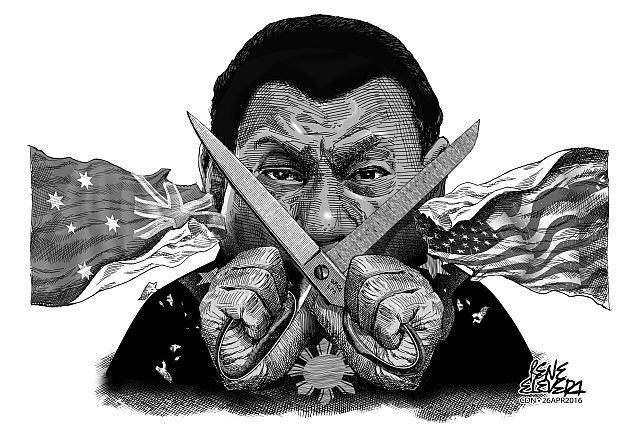
Professional campaign strategists call it “the bandwagon effect,” and Davao City Mayor Rodrigo Duterte is riding the wave caused by that effect courtesy of his campaign staff who have worked double time in creating that impression of snowballing mass support for his candidacy.
That effect has also shielded him from the fallout of his “rape comment” on the late Australian missionary Jacqueline Hamill which drew the ire of many women’s groups and the Church which advised voters to choose leaders with decency.
Duterte’s showing in the Pulse-Asia survey commissioned by ABS-CBN showed him still maintaining a lead over his closest rivals heading to last Sunday’s debate, and with less than two weeks to go before the elections, his supporters are all but declaring that his victory is in the bag.
But his comments over the US and Australian governments’ criticism of his rape comment should give serious pause to the country’s voters concerning his mindset on foreign relations.
Duterte said both the US and the Australian governments can go ahead and sever their ties with the Philippines, even going so far as telling them to “shut up” and not to interfere with the country’s elections.
As has been pointed out, Duterte’s remarks may impact on the Filipino-American community in the US which has grown in number over the years and has come to embrace and be embraced by their fellow Americans. Not to mention the number of American investors who have set up shop in the country.
There are also Filipino-Australians in the Land Down Under, and Duterte’s crass, crude comments on Hamill have so far not caused a backlash on them. The Davao City mayor may be unafraid to run off at the mouth since he has yet to be voted on by the Filipino people.
The mayor’s statements against the US and Australia may also be his way of testing the waters, so to speak, by sparking debate on the extent of American or foreign influence in the country.
While the mayor may excuse his statements against the US and Australia by proclaiming that he isn’t anti-American but “pro-Filipino” — a line commonly used by militants in denouncing alleged US interference in the country’s political and economic affairs — Duterte’s friendly tack with the Chinese government and his willingness to negotiate with them over the Spratlys dispute has people thinking whether he’s betraying the nation’s interests and is trying to veer the country into subservience to the People’s Republic of China.
All these speculations and fears and he’s not even elected into office yet. The mayor’s statements portray him as someone who won’t tolerate criticism and opposition and, based on his own tales, is likely to shut down or silence that opposition.
If anything, Duterte’s statements and actions should merit careful evaluation before anyone decides voting him into office.